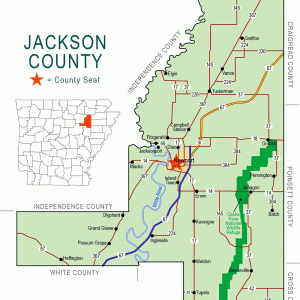calsfoundation@cals.org
Beedeville (Jackson County)
| Latitude and Longitude: | 35°25’44″N 091°06’35″W |
| Elevation: | 220 feet |
| Area: | 1.14 square miles (2020 Census) |
| Population: | 84 (2020 Census) |
| Incorporation Date: | November 7, 1963 |
Historical Population as per the U.S. Census:
|
1810 |
1820 |
1830 |
1840 |
1850 |
1860 |
1870 |
1880 |
1890 |
1900 |
|
– |
– |
– |
– |
– |
– |
– |
– |
– |
– |
|
1910 |
1920 |
1930 |
1940 |
1950 |
1960 |
1970 |
1980 |
1990 |
2000 |
|
– |
– |
– |
– |
– |
– |
144 |
183 |
141 |
105 |
|
2010 |
2020 |
|
|
|
|
|
|
|
|
|
107 |
84 |
|
|
|
|
|
|
|
|
Beedeville is a town in southeastern Jackson County. It is located on State Highway 37 near the Cache River. Sawmills built in Beedeville early in the twentieth century attracted the interest of railroad investors, but the line that included Beedeville in its name was never completed to the town.
The Cache River served as a transportation corridor both before and after European explorers entered Arkansas. The actual river valley, prone to flooding, remained sparsely settled even after Arkansas became a state. William H. Beede, who arrived around 1866, was probably the first settler to occupy the current site of Beedeville. He helped to organize the first public school in the area in 1880. A Church of Christ was established near Beede’s home in 1878.
Most of the early settlers were involved in farming, but the many hardwood trees along the river also drew investors from the timber industry. There were four sawmills near Beedeville by the opening years of the twentieth century. A post office established in 1904 was named Plunkett for the first postmaster. In 1910, the post office was moved about three miles into the Beede store, and the name was changed to Beedeville (either to honor the community’s first resident or for Fletcher Beede, William’s son and the first postmaster after the move).
In 1906, twenty-two businessmen of McCrory (Woodruff County) provided financial backing for a railroad to be called the McCrory Tramway and Transfer Company. Four years later, the same group joined in support of a railroad to be called the McCrory and Beedeville Southern Railway. Plans were made to start a line in McCrory and build it in stages to the northeast until it reached the sawmills in Beedeville. Shares were sold; materials were bought or rented from both the Rock Island Railroad and the St. Louis, Iron Mountain, and Southern Railroad; and construction began. Throughout the history of the line, however, expenses exceeded funding. Company directors promised that, with more tracks laid, more profit would be made, and more shares would then be sold. These hopes were unmet, and the railway fell into default and ceased operations in 1914. Eleven miles of track had been completed, but the railway still fell seven miles short of its intended destination of Beedeville. In 1923, plans were made to extend the Bonnerville and Southern Railroad as far as Beedeville, but the final stage of construction fell two miles short of the town. The line closed on December 31, 1934, and the railroad bed was eventually converted for truck and automobile traffic as Highway 37.
Even without a railroad connection, the town steadily grew. By 1930, Beedeville had four stores, a cotton gin, and a barbershop, as well as a working sawmill that made saw handle blades. Clinton Dabbs owned a trailer he converted into a “rolling store” that visited neighboring farms to sell sugar, flour, cheese, tobacco, and other items. The trailer also carried passengers to Newport (Jackson County), charging a fare of twenty-five cents. Over the years, Beedeville has been home to a Lions Club, a Boy Scout troop, and a lodge of the Independent Order of Odd Fellows. The lodge closed in 1967.
Several school districts were consolidated into the Beedeville school district during the first half of the twentieth century. The schools were desegregated in 1965. Beedeville remained unincorporated until 1963, when its citizens elected to incorporate as a town. By this time, the timber industry had cleared most of the hardwood trees, and the sawmill had closed. Beedeville became an agricultural community, and the principal crops in the area by the end of the twentieth century were rice and soybeans. In 1985, the Beedeville school district was consolidated into Newport’s school district.
The Beedeville area was struck by a tornado on June 6, 2014. The EF-1 tornado, which was on the ground for two miles, was fifty feet wide and had winds in excess of 110 miles per hour. The tornado damaged an airplane hangar and destroyed a nearby shop, but no one was killed or injured.
Wyant Beede—a direct descendant of William Beede, the town’s founder—was elected mayor of Beedeville. No stores or businesses are located in Beedeville, and the only church is the Church of Christ, founded in 1878.
For additional information:
Dabbs, Laura Jane. “Laura Jane: Her Life, Her Story as Told in Her Own Words.” N.p.: 1978.
“Odd Fellows Hall First Building in Beedeville.” Jackson County Democrat, February 10, 1938, p. 1.
Pollard, Bill. “The McCrory & Beedeville Southern Railway.” Arkansas Railroader, January 1994, pp. 11–17.
Siegele, Diann S. “Beedeville in Jackson County Was Known as Cowlake and Gourdneck.” Stream of History 38 (2001): 24–25.
Steven Teske
Butler Center for Arkansas Studies
 Jackson County Map
Jackson County Map 




Comments
No comments on this entry yet.